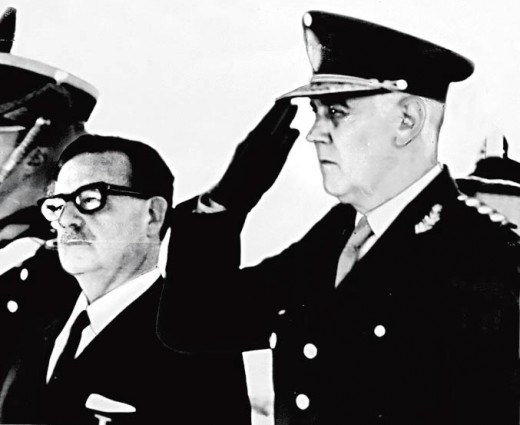Diplomatic Dispatch - A State Funeral

At the ceremony that should have been a commemorative, unparalleled event, a number of people representing rivaling factions suddenly appeared and, by virtue of their very presence, made things complicated for everyone. Some people, especially those over at State, had been investing weeks of hard work and much prestige in making this arrangement as prestigious and unforgettable an event as humanly possible, but now they suddenly had to deal with interference by the staffers over at the Secret Service, the FBI, the ATF, and other agencies concerned with security more than with style.
A funeral, almost any funeral, tends to be an emotional event; everyone knows that. It is also common knowledge that at such events passions tend to flare up among the surviving relatives, who suddenly have to face one another in the naked situation that has been caused by the sudden absence of the deceased. If one or several relatives bear resentments towards others, towards the deceased, or both, and especially if they have been foolish enough to make those resentments known, then even the most neatly arranged funeral has the potential for becoming an ugly, explosive event.
Then imagine what may happen when the person being laid to rest is a statesman, i.e. a person of such import that high-ranking officials and dignitaries find it necessary to hastily travel clear across the globe in order to participate. Now there they were, standing in front of the Synagogue, taking in the faint aroma of freshly cut white-and-pink roses, listening to the birds, shaking the very hands that they would usually not fail to claim were ”smothered in the blood of our Martyrs, our Sons, who died such a heroic death.”
Now, why did they shake those hands then? Could the reasons be so plain as that those hands had been recently washed with chloroform, or perhaps even been thoroughly cleansed through some reconciliation effort?
A plainclothes policeman standing nearby the entrance stood by in awe as he watched the bitterest of enemies exchange civilities and greetings as if though nothing was between them. The idea crossed his mind that perhaps everyone present were actually quite glad that the deceased was no longer on Earth keeping an eye on everyone, that maybe it was the deceased who single-handedly had managed to maintain this seemingly perpetual state of hostility, this intolerable status quo, through simply being alive. This plainclothes policeman felt warm at heart, because he utterly believed that things were now going to get so much better, the streets so much safer, the school buses so much less likely to be bombed, the landmines effectively swept away, the rhetoric so much gentler and more understanding and reconciliatory, and so forth.
That plainclothesman was Joseph Saphier. The funeral happened while he was still a recent recruit of the FBI, at which point political enthusiasm, and with that incredible naivete, still ran through his blood. Joe did believe that the world was going to become a better place simply because it had to, and he would happily grab any symbol – even one as shallow as a hasty handshake exchanged during a highly publicized funeral – and use it to support his beliefs, theories and deep-felt convictions. Not until much later did it begin to dawn on him that he had been utterly wrong in his interpretation about what had occurred at the funeral and about a lot of other things.

The diplomat was present as well. Already as seasoned State Department employee at that time, he had been circulating among various positions both domestically and abroad, and his current assignment was little different from so many others which he had been receiving for the past year or so.
In contrast to Joseph Saphire he was by no means politically naive, and he pretty much knew exactly what was going on as the conflicting political leaders greeted each other outside the synagogue. Had they met in private, some of them might very well have refused to shake hands with their enemies, but these were media savvy people who were immensely aware of the presence of much of the free press and some of the not so free press as well. They realized that by refusing to exchange handshakes with statesmen of other countries or organizations, they would come out as someone who was unwilling to compromise even in the current political vacuum that had been generated by the death of the Israeli prime minister.
Once one of the State Department hopefuls, the diplomat had undertaken a number of highly demanding assignments overseas, which had provided him with an abundance of experience but little in terms of a suitable, permanent position within the foreign service. He was a much-liked figure, who had numerous friends, acquaintances, and lose associates both within the system itself and beyond. Some of those included people involved in domestic politics, others were industry leaders, and many of these people had frequently and with increasing intensity encouraged him to simply ask for a leave of absence and run for office. The idea, which had originally seemed to him so distant and unrealistic, no longer appeared quiet so remote as he looked at the statesmen, once again wondering what really might be going on behind their masks and behind those eyes that shone as if they had been made of precious stones.
When later the diplomat did in fact leave the State Department and entered politics head-on, he would often think of this particular funeral as his reason for having changed his career so dramatically. Because, despite the promises which the occasion had seemed to give about the possibility of the future solution for the Middle East, things had gotten worse – much worse, in fact – right afterwards. The statesmen had all made a safe return, of course, but several civilian aircraft had been blown up in the subsequent weeks and months, and exactly one year after the funeral he and his colleagues at State were still struggling to even get the parties to schedule meetings for a resumption of the negotiations. It was these events, both when viewed in isolation and especially when viewed in combination, that had given him an overwhelming feeling of hopelessness, exhaustion, and general cynicism which he found dreadful to the point being, quite frankly, unbearable.
(c) Copyright 2010.
- Diplomatic Dispatch: Brinkmanship
Political extremism does not just symbolize a violent form of expression based upon the willingness to violently overthrow the government, but also as set of ideas about how to conduct political negotiations....






